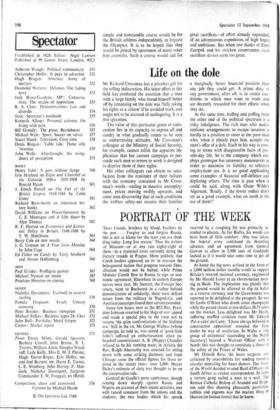One gesture well worth making
•
lie horror 0 e f the Soviet occupation of khoslovakia mounts with each passing 1;41', and with it the humiliating sense of help- 4`441ess with which the outside world looks qtti' The Soviet rulers are steadily increasing eir pressure to break down the Czecho- ;11?vak people's magnificent passive resistance. ,1 there nothing, nothing. which the free 4'?.1.10tries can do to provide succour for the kielitris of this most hateful exercise of naked wee') 4:the list of possible courses of action is jjY brief. Military action is ruled out. The ctiveness of trade boycotts has been mov kir ed all too often. There is clearly a case 0 :ending `cultural relations' with the Soviet itilig.,"3n so long as the invading armies remain it \-lechoslovakia but it is a debatable one; 41% be argued (and indeed is argued by a 441ributor elsewhere in this issue of the qAToR) that even when 'cultural relations' thel)eiar to be a disreputable farce, it is not in t[it Icing term interest of freedom to sever tklitere remains, however, one immediate ‘viirlire,s8ion of the free countries' revulsion .en would inflict a telling blow upon the skeessors, and which would convey some Ikt14,11, Measure of cheer to their .victims. The ctians—together with their accomplices in Poland, Hungary, Bulgaria and East 'Y—could be excluded from the forth- ketkl,rig Olympic Games. Without in the least iiqic'Ing to exaggerate the value of such an thorn, one may say that it would be p1c),11g.hly worthwhile.
wou • 811Y it Id administer an inescapable , kvi,1,11e.421 political defeat and deprive the government- of much-needed inter- 414(041 prestige. The Russians have never -4ny pretence of using the Olympic its (and international sport in general) as ^ anything but a weapon of political warfare. As Pravda has phrased it, `A successful trip by the sportsmen of the USSR and of the People's Democratic countries is an excellent vehicle of propaganda in capitalist countries,' and the Soviet rulers have been ruthless in their application of this principle. Soviet 'sportsmen' are all well-paid and privileged professionals, employed to gain prestige for the Soviet political system.
Secondly. exclusion from the Olympics is perhaps the only way to bring home to every Soviet citizen the world's abhorrence for his government's latest outrage. The Olympic Games form the one international event about which the Soviet public is fully informed and which it is able to follow in detail and with keen interest, Exclusion from Mexico would pierce the barrier of lies which prevents them from knowing about the reaction even of foreign communist parties to their country's invasion of Czechoslovakia.
Thirdly, this would be a gesture of moral disapprobation; an expression of public opin- ion, not of governmental policies; and one which would neither be „concerned with an intensification of the cold war, nor 'would endanger the peace of the world.
According to International Olympic Com- mittee regulations, a motion to exclude a member can only be proposed by a National Olympic Committee. The British committee could thus become the spokesman for the nation by initiating such a motion. and then by mustering the support of the committees of every other democratic country. As it hap- pens, the ioc has itself, earlier this year, pre- pared the way by expelling South Africa from the Games. South Africa was banned not for the practice of apartheid but, as the resolution said, because of 'the international climate' and fears of violent protest. Russia was a chief supporter of this resolution : what is sauce for the goose is sauce for the gander. Dare anyone say that the international climate has proved any more benevolent towards Russia's rape of Czechoslovakia 'than to South African apartheid?
For seventy-two years the modern Olympic movement has proclaimed as its aim the fostering of 'the comradeship of sport' and of understanding between sportsmen of all nations. There is now an opportunity to de- monstrate that these proclaimed ideals are more than mere words. Emil Zatopek, one of the greatest of all Olympic athletes, is today a threatened man in his own country. A fort- night ago he called upon his foreign friends and fellow-sportsmen to expel the Soviet Union and its jackals from the Olympic Games. It is inconceivable that his appeal should not find a response among Britain's own Olympic contenders; already. in fact, it has been reinforced by great British athletes like Gordon Pine; it must not be allowed to pass unheard.
Possibly such a considered rebuff to Russia by the international community of sportsmen could lead to the ending of the Olympic Games, in their present form at least. There is nothing in such a possibility to cause great dismay. The Olympics have long been tainted by political wrangles and between competing nations: their disappearance, above all in present circumstances, would in no sense be disastrous. And since the Olympic movement has already been transformed into a political forum, an effort at least must be made to utilise this forum in the cause of civilised standards against those of armed aggression.
It may be that the toc would betray its own ideals and refuse to exclude the aggressors from the Mexico Games. In that event the simple and honourable course would be for the British athletes independently to boycott the Olympics. It is to be hoped that they would be joined by sportsmen of many other free countries. Such a course would call for great sacrifices—of effort already expended, of an adventurous expedition; of high hopes and ambitions. But when one thinks of Emil Zatopek and his stricken countrymen, such sacrifices do not seem too great.



































 Previous page
Previous page